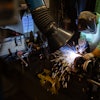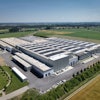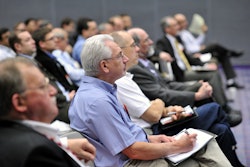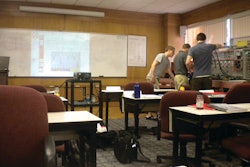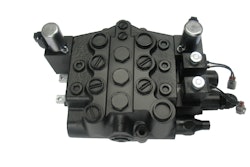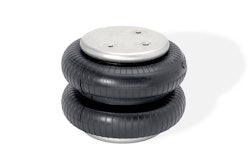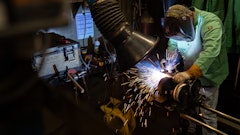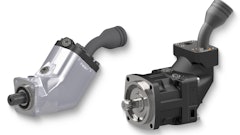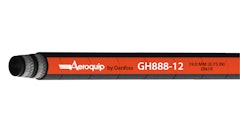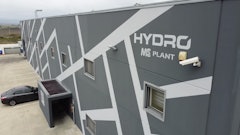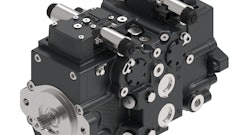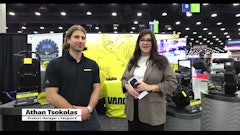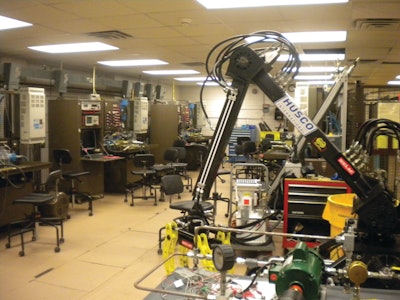
The Milwaukee School of Engineering (MSOE) is an established and nationally recognized college focused on the development of mathematics, business, nursing and engineering professionals. It is one of the only engineering schools with a strong fluid power focused curriculum with hands-on laboratory experience available (see Sara Jensen's article, "Taking a hands-on approach" to learn more about MSOE's lab program for its students at www.oemoffhighway.com/10426715).
Projects worked on at MSOE are often funded by companies and corporations in the industry to utilize the school's testing and prototyping capabilities while at the same time offering experience to graduate and undergraduate students. This cooperation through MSOE's Fluid Power Institute has been supplying engineering services to companies since 1962, and shows no sign of stopping. "MSOE is recognized for the practical way it teaches students engineering principles through significant lab work. We hire them to perform projects for the industry to gain real life skills, and in terms of fluid power technology specifically, MSOE is one of the few schools nationally recognized because of its continuous and uninterrupted relationship with the industry," explains Dr. Medhat Khalil, Ph.D., Director of Professional Education & Research Development at MSOE's Applied Technology Center. Khalil is also a certified fluid power hydraulic specialist and an accredited fluid power instructor.
While at IFPE 2014 (event information, 10207254) in Las Vegas, NV, MSOE showcased its programs, projects and students to the off-road equipment manufacturing industry. "The Applied Technology Center (ATC) is the research arm of the school that has been formed to reinforce the relationship between the school and industry," says Khalil. "Under the ATC umbrella we have several centers of excellence. The first of which is the Professional Education and Research Development (PERD) department which provides courses for industry professionals to continue their education and skill development in the field of fluid power." At IFPE, MSOE showed what kind of courses it provides (download the 2014 seminar schedule brochure at www.oemoffhighway.com/11305571) and the exercises people perform during the training.
Another center of excellence—and an over 30-year member of the National Fluid Power Association (NFPA)—is the Fluid Power Institute (FPI), a leading academic fluid power research laboratory that performs projects for the industry, as well as U.S. military system evaluations. The institute has specialized equipment for pump, valve, motor, cylinder and filter testing, as well as in-house capabilities to conduct endurance testing, performance testing, environmental evaluations, component and system design, modeling and simulation, reliability analyses and system integration.
Its research and evaluation projects for the fluid power industry span design and development from component to full system integration. Projects have included hydraulic system modeling for steady-state operations and various construction equipment; high pressure pump design; contamination-robust hydraulic valve design; and a combined modeling and test/evaluation project of an excavator's hydraulic system to establish dynamic and steady-state performance of its hydraulic system for the crowd function on a large-scale mining shovel. The project scope is diverse, and the contribution to technology advancement for the off-highway industry is valuable. Companies and professionals in the engineering community can work through the FPI to mentor and guide the project and work with the students as potential future workforce.
The ATC's Rapid Prototyping Center (RPC) was also represented at IFPE to demonstrate the school as a resource for companies to utilize while helping student development. The RPC helps industry members build prototypes needed for the pre-manufacturing stage to make sure the component works within a given design's parameters. The supplemental engineering support allows businesses to complete the prototype phase more quickly, helping to get products to market faster. This also benefits MSOE students by giving them the opportunity to meet and work with industry professionals while giving the professionals a chance to vet future candidates for the fluid power workforce.
The RPC along with MSOE students helps designers and engineers eliminate fasteners and glue joints within their assemblies, eliminating multiple components and overall system complexity. Solutions are possible for almost every problem with the RPC's 10 installed systems from five different technologies, and more than 15 different material choices; and now that additive manufacturing has leveraged the use of secondary processes such as producing masters for silicone molding, investment casting, sand casting, blow molding and thermoforming, lead-times are even shorter.
On top of all of the school's resources and connections to the professional industry on display at MSOE's IFPE booth (S-80035), senior design projects were also exhibited, demonstrating student research and technology development for industry contribution and advancement.

